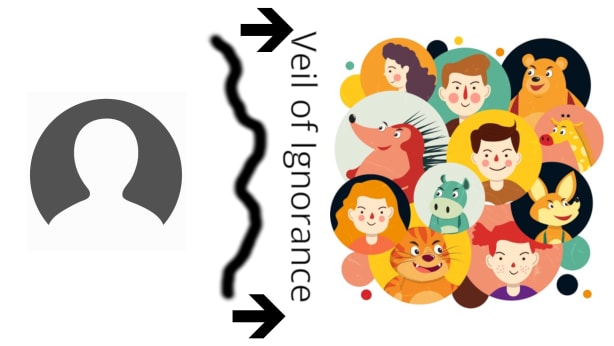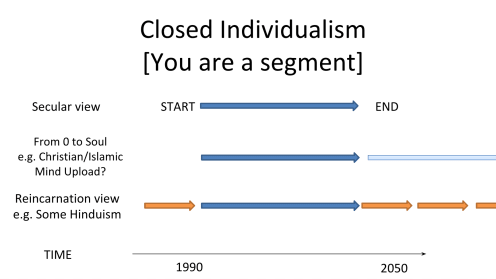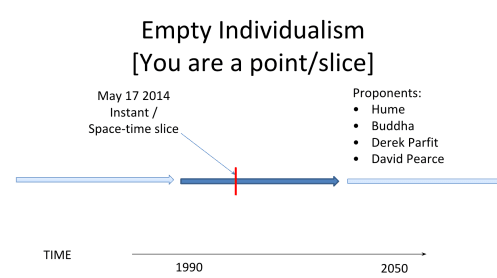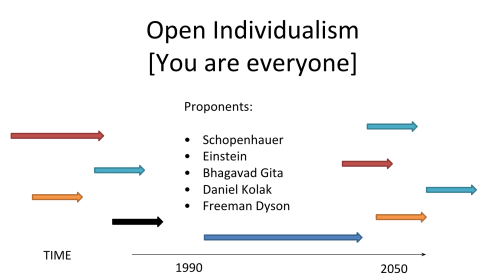How the veil of ignorance grounds sentientism
By VeryJerry @ 2025-06-03T17:26 (+21)
Epistemic status: Intuition pump/map for navigating ethics
Introduction
In this essay, I argue that John Rawls’ veil of ignorance is not merely a philosophical thought experiment, but a useful and mostly accurate description of reality when viewed through certain theories of personal identity. This framing leads to sentientism, that all sentient beings are morally relevant . This helps clarify the is/ought problem, and has implications for how we should act both individually and as a species.
The Veil of Ignorance and Its Traditional Use
John Rawls's "original position," part of his social contract theory of justice, introduces the thought experiment of the "veil of ignorance." Behind this veil, individuals are tasked with designing a just society without knowing their own future place within it. They are aware of general facts about human society, but critically, they are ignorant of their personal attributes, social status, or even their specific talents and disadvantages. This means they could emerge as the most privileged or the most disadvantaged, or anywhere in between. This epistemic limitation, Rawls argues, compels individuals to choose principles of justice that are fair to all, as they would not want to risk being subjected to an unjust system themselves. From this perspective, Rawls posits two core principles: equal basic liberties for all, and that any social and economic inequalities must benefit the least advantaged members of society.

While the veil of ignorance offers a powerful framework for conceptualizing justice within human societies, its true potential, I argue, emerges when we extend its scope. Broadening the range of potential identities to encompass all sentient beings, and by further integrating the complexities of personal identity, I believe, offers a more robust and inclusive approach to ethical and societal design.
Sentience and the Scope of Moral Relevance
By 'sentience,' I mean the capacity to experience positive and negative subjective states, particularly suffering and pleasure (i.e. valence). This includes human and non-human animals, and potentially future artificial minds or aliens. I'm using consciousness interchangeably with sentience to generally point to the experience of experiences and feelings, especially valenced ones (like pleasure and pain).
Personal Identity and the Ontology of Consciousness
Viewing it from the three main categories of personal identity I'm aware of, Closed, Empty, and Open Individualism, I think the original position accurately describes an aspect of reality for Closed and Empty Individualism, and that there are large ethical implications of it. Open Individualism just has massive ethical implications in it's own right and in a sense my argument is that even Closed and Empty Individualists end up at a similar ethical place.
I'll be summarizing the forms of Individualism as described in Ontological Qualia: The Future of Personal Identity, and it has this warning which may apply to the rest of this essay as well: "WARNING If you are not psychologically robust, this may be a memetic hazard. It talks about ideas that may affect hedonic tone in people susceptible to bad philosophical experiences." The diagrams are also from the same blog post.
Closed Individualism
Closed Individualism is the common, standard, intuitive-to-most-people view of identity. “You begin to exist when you are born and you stop existing when you die.” This can be modified slightly with beliefs such as souls and an afterlife, but generally speaking "The main conditions for a view to be classified as Closed Individualism is that (1) there is at most one instance of you at any given point in time, and (2) you continue to exist moment after moment."

If you use the lens of Closed Individualism, before you are born, you could be born as any possible sentient being. In other words, the set of all conscious beings born in a given moment is in a sense all the beings exiting the veil of ignorance. Behind the veil we'd rather be born into the best life possible, and certain lives filled with suffering would be especially undesirable, but we wouldn't know which one we'd get - we could be born as any species or entity that's sentient, which means that from behind the veil, we'd want those outside the veil to reduce our odds of being born as a suffering sentient being before it happens.
Empty Individualism
Empty Individualism is the view that "you" are a time slice of consciousness. Although it feels like you're a continuous being as described in Closed Individualism, under Empty Individualism that's an illusion caused by memory being part of the information within each slice of consciousness. So, at least in "normal" states of consciousness, each time slice feels like it's the same being as the one that formed the memories that give rise to it's own experience. The moment of consciousness includes awareness of things experienced by previous moments of consciousness.

From the lens of Empty Individualism, the time-slice of consciousness "you" find "yourself" in could be the slice of any sentient being. All time-slices of consciousness at a given moment are essentially exiting the veil of ignorance. Again, before you find out which time-slice you experience, you'd want all the time-slices to coordinate to make sure your slice is not one of suffering but ideally is one of pleasure instead. Some time slices choose to sacrifice their own well-being in the short run for the well-being of other slices in the long run, which may be admirable, but ideally we'd find ways to do both - improve the experience of other time slices without creating suffering in our own.
Open Individualism
Open Individualism is the view that all consciousness is a part of one larger "whole", so although there may be many separations and distinctions between different sentient beings, at the root of it all, they are all one. One way of looking at this is to consider that there may be parts of your subconscious that are actually conscious, but you don't have access to those experiences any more than you have access to the experiences of "another" person. Open Individualism would suggest that it's the same thing for the whole universe.

From the lens of Open Individualism, you already are every conscious being. Ethical concern for others becomes indistinguishable from self-interest. This doesn't fit as cleanly into a veil of ignorance analogy, but I think if you hold this view it should be even more clear that reducing suffering is very important, even (in fact, especially) "selfishly" speaking.
How the Veil of Ignorance Describes Reality under Closed and Empty Individualism
Both Closed and Empty Individualism posit that consciousness comes into being at some point, either when they are born or at the beginning of a time-slice of consciousness. As soon as a consciousness begins to exist it can be viewed as someone leaving the veil of ignorance and finding out what kind of experience they'll have.
From behind the veil of ignorance, we'd want the people in society to be making sure we don't enter into bad experiences when we leave the veil of ignorance. Now we are the ones outside the veil of ignorance and can choose to either uphold and enact the values we would have endorsed while behind the veil, or ignore them and act selfishly. Of course, you could have a position behind the veil of "no matter who I'm born as, I will put my own subjective experience above all others", but I think many people being honest with themselves would have pretty high-minded ideals from behind the true veil of ignorance - the one that includes all sentient beings - while facing the odds that their experience is full of suffering. Now our task is to live up to those as best we can.
Sentientism and the Is/Ought Problem
This view, taking into account the veil of ignorance, the ontology of personal identity, and the resulting sentientist perspective allows us to resolve the is/ought problem in the same way that it's resolved when you touch a hot stove - what "is" is the experience of pain and heat, and the "ought" is removing your hand. Sentientism takes this logic and generalizes: any conscious experience of suffering gives rise to a moral imperative to alleviate it.
Of course, taking into account the entire moral landscape makes things a lot trickier. We are still individuals without direct access to the experiences of others (and there are a lot of relevant "others"), so as usual, good epistemology ("evidence and reason") is vital to guiding our actions. Thus, the tagline for sentientism: "Evidence, reason and compassion for all sentient beings". Evidence and reason enables us to succeed at our goals without making things worse, and either the veil of ignorance or Open Individualism gets us compassion for all sentient beings.
This is not a literal description of reality
To be clear, I'm not saying that there are literally conscious entities (what people might call "souls") hanging around behind some literal cosmic boundary that separates them from our world, which then get transferred from there and connected to the brains of sentient beings here. I think conscious entities get created when their brain/nervous system starts generating consciousness, and that this is analogous to leaving the veil of ignorance, in such a way that it makes the veil of ignorance perspective a useful map of how we should do ethics.
Conclusion
In this essay, I argued that Rawls’ veil of ignorance is not merely a philosophical thought experiment, but a useful and mostly accurate description of reality when viewed through certain theories of personal identity. This framing leads to sentientism, "evidence, reason, and compassion for all sentient beings". This helps clarify the is/ought problem, and has implications for how we should act both individually and collectively. I think it provides a selfish-ish backing for caring about the suffering of others, if pondering The Horror Of Unfathomable Pain doesn't do it for you.
To me, the ideas I've put forward here seem almost tautological, but it took me a long time to understand things in this way, and I see barely anyone talking about the veil of ignorance. I’m planning to start writing about the importance of AI moral alignment and why we need AIs to be sentiententists rather than only humanists, but first I think it’s important to establish sentientism as more than just another ungrounded philosophy. I hope you found it useful, enjoyable, and interesting! Also, any notes on my writing are welcome, I'm just getting into writing like this :)
Vasco Grilo🔸 @ 2025-06-04T19:01 (+4)
Thanks for the great post, VeryJerry! Strongly upvoted. I also like to ground altruism in how one would act behind the veil of ignorance.
Ronen Bar @ 2025-06-04T07:30 (+4)
Thanks, interesting post, and I wonder how this can relate to AI and the ethical questions around AI vales
VeryJerry @ 2025-06-04T12:07 (+3)
Yeah, that part I'm less sure about, especially since it's in large part a subset of aligning ai to any goals in the first place. I plan to write a post soon on what makes different values "better" or "worse" than others, maybe we can set up a brainstorming session on that post soon? I think that one will be much more directly applicable to AI moral alignment
Ronen Bar @ 2025-06-18T08:47 (+1)
Sure, I am happy to do that.
JamieWoodhouse @ 2025-08-07T13:48 (+2)
Thanks Jerry. You might find the work of Mark Rowlands, Dombrowski and others interesting - they've done fascinating work on extending Harsanyi / Rawls' Veil of Ignorance beyond the human. A related article here that includes some good references: https://www.animal-ethics.org/justice-for-all-what-the-veil-of-ignorance-shows-us-about-a-just-society/
SummaryBot @ 2025-06-04T14:36 (+1)
Executive summary: This exploratory essay argues that John Rawls’ veil of ignorance, when interpreted through certain theories of personal identity, provides a realistic ethical framework that grounds sentientism—the moral relevance of all sentient beings—and helps resolve the is/ought problem by compelling compassion and evidence-based action toward reducing suffering universally.
Key points:
- Rawls' veil of ignorance, traditionally a thought experiment for justice among humans, gains deeper ethical significance if extended to all sentient beings by considering different theories of personal identity.
- The author discusses three views on personal identity—Closed Individualism (the standard "one lifetime" self), Empty Individualism (consciousness as discrete time-slices), and Open Individualism (all consciousness as one)—showing how each supports a broad ethical concern beyond oneself.
- Under Closed and Empty Individualism, being "behind the veil" means we could be any sentient being, so rational self-interest encourages reducing suffering for all, since we might end up experiencing it ourselves.
- Open Individualism implies an even stronger ethical stance, where caring for others is identical to caring for oneself, reinforcing universal compassion.
- Sentientism, defined as prioritizing evidence, reason, and compassion for all conscious experiences, provides a compelling response to the is/ought problem by linking actual experiences of suffering (is) to the moral imperative to alleviate it (ought).
- The essay clarifies that this framing is a conceptual and ethical map, not a literal metaphysical claim about souls or consciousness existing before birth, and highlights implications for individual and collective moral action, including AI alignment.
- The author aims to establish sentientism as a grounded ethical framework, inviting further discussion and refinement, especially in relation to future AI ethics.
This comment was auto-generated by the EA Forum Team. Feel free to point out issues with this summary by replying to the comment, and contact us if you have feedback.